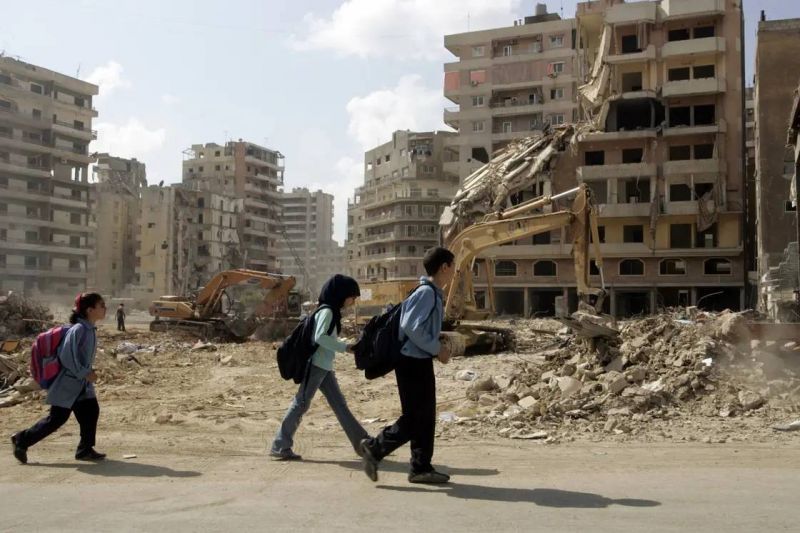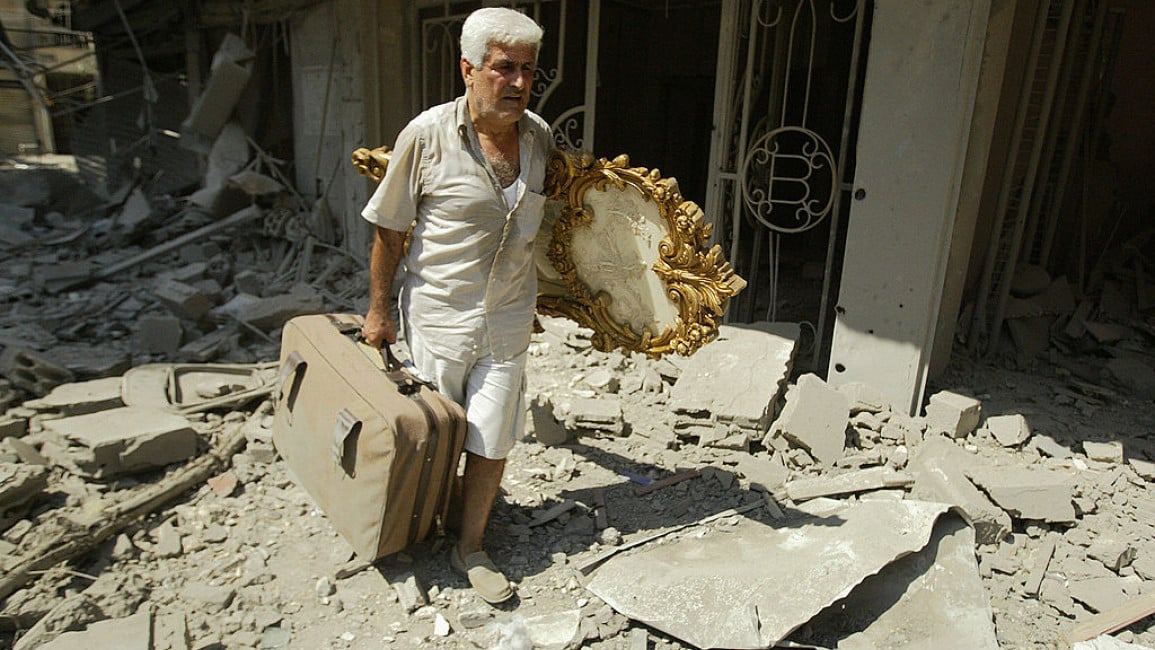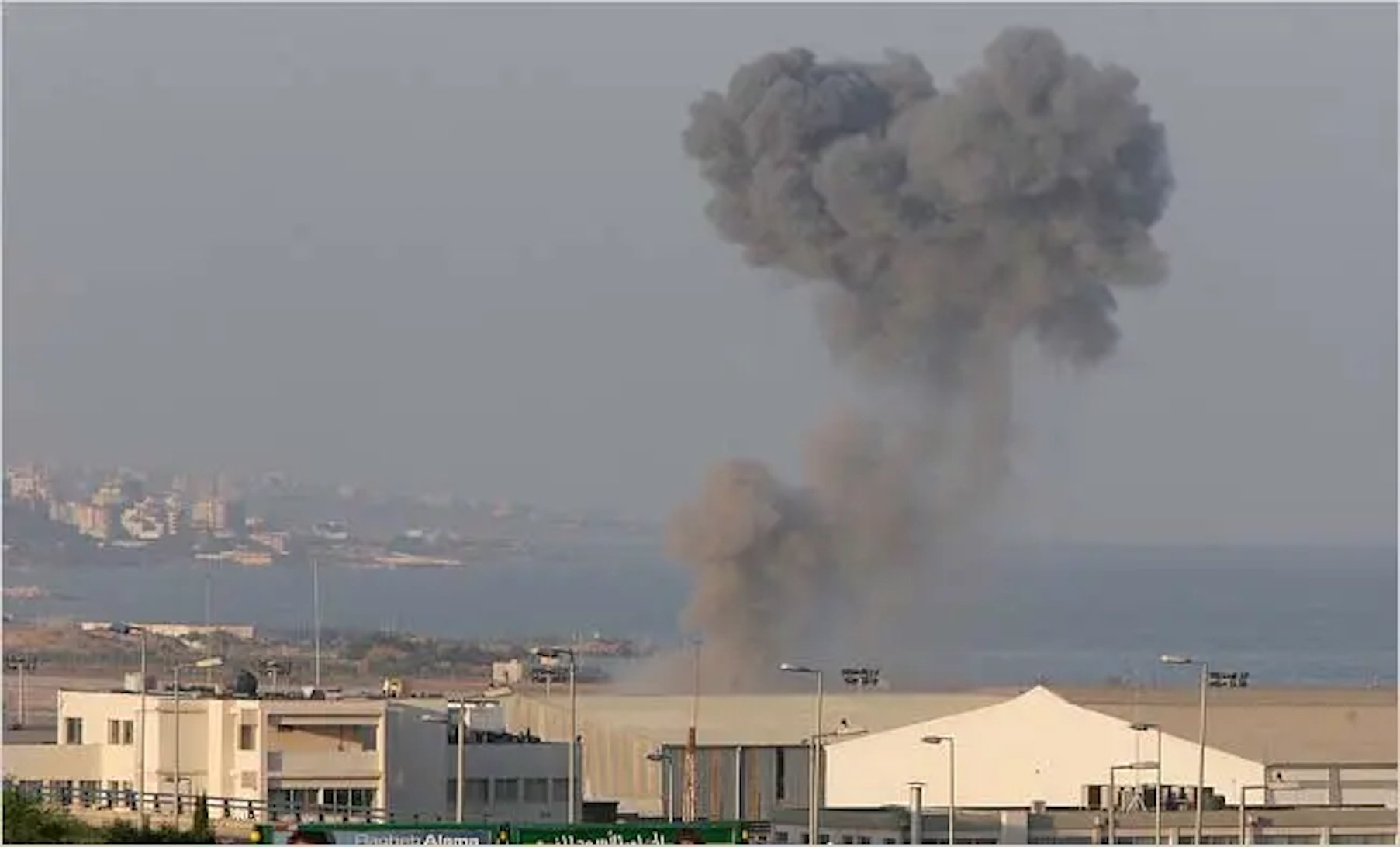
School children leave Beirut's southern suburbs during the July 2006 war. (Credit AFP)
BEIRUT — With recurring tensions at Lebanon’s southern border, some have compared the summer of 2023 with that of 2006. Seventeen years ago now, that summer was expected to be a boon for tourism — much like this one — until the July war cut short so many plans.
Between July 12 and Aug. 14, 2006, Israel imposed a land, air and sea blockade on Lebanon, after Hezbollah operatives captured two Israeli soldiers in a cross-border raid, which they hoped would secure a prisoner swap deal with their Israeli counterparts. Israel responded militarily to retrieve the two soldiers and with the intent of destroying Hezbollah.
Over 34 days, Israel carried out thousands of air strikes while Hezbollah fired missiles into northern Israel.
According to Human Rights Watch (HRW), “the conflict resulted in at least 1,109 Lebanese deaths — the vast majority of whom were civilians — 4,399 injured, and an estimated one million displaced.”
Forty-three Israeli civilians died — mostly from Hezbollah rocket fire — and 117 Israeli soldiers were killed in the conflict.
L’Orient Today spoke to four young Lebanese civilians about their memories of the war.
‘I was convinced I was going to die’
“I was 12 years old and it started like an average summer in Lebanon in Sour, [South Lebanon] with endless days on the beach and long nights with family members who came from abroad to spend the summer holiday at home,” 29-year-old architect Rani Ahmed told L’Orient Today.
Rani recalls waking up on the night of July 12 to the sound of heavy explosions. He initially thought he was hearing fireworks.
“I had a neighbor who was sure he wouldn’t pass the 12th grade exam and had promised he was going to light up the whole neighborhood with fireworks if he passed, and I thought that was it,” Rani recalled.
“My mother woke my brother up and told us to put on our shoes and hurry outside where my dad was waiting for us,” he continued.
Rani and his family then drove to Saida to stay with a distant family member for a few days before crossing the border to Syria — “the easiest place to reach.”
According to UNHCR, Syria received over 300,000 Lebanese who fled the 2006 war, and Syrians were “overwhelmingly generous in opening their homes, mosques, convents, community centers and public schools to the thousands of Lebanese refugees.”
“I remember the journey from Saida took us around 12 hours instead of the average three hours because the taxi driver had to keep stopping at the side of the road and turning off the engine and the cars headlights, fearing that the car would be attacked by Israel,” Rani explained, recalling that the Israelis were targeting moving vehicles.
“I was too young to understand, I just wanted to be back in Sour swimming on the beach. Now I know. I understand,” he said. “Every time I see an escalation in Gaza, I think to myself, ‘It could be me.’ I was once in this position too and the injustice makes me so angry.”
 A Lebanese man carries personal belongings from a bombed residence in Beirut's southern suburbs, 10 Aug., 2006. (Credit AFP)
A Lebanese man carries personal belongings from a bombed residence in Beirut's southern suburbs, 10 Aug., 2006. (Credit AFP)
‘My grandma wouldn’t leave Khiyam before finishing preparing labaneyeh’
Zeinab Hammoud was eight years old and on summer vacation in Lebanon when the war broke out. She was on her way to their neighbor’s house with her grandma when they saw Israeli warplanes flying over Khiyam, a village near the southern border.
“My grandma started a zalghouta because she knew that any crossing of Israeli warplanes would end in a victory [for Lebanon],” Zeinab recalled, “or that’s what she said.”
“When we went home that day all the adults around me were stressed, and my father was frantically calling my mom from Qatar, where he was working, to check up on us,” Hammoud told L’Orient Today.
Zeinab’s mom kept insisting that there was nothing wrong, until one fateful night.
“We were at my aunt’s house at night grilling corn when Israel started bombing the village. My uncle kept telling us kids that those are just fireworks, but I knew what was going on,” said Zeinab. “It opened my eyes to the reality of what bombs are and what they mean.”
“I remember spending a day during the war picking mloukhieh with my grandma in Khiyam. My father kept calling my grandmother [telling her that his] wife and kids won’t leave Khiyam unless [she] leaves, and she insisted that she didn’t want to leave Lebanon,” Zeinab said.
The village had emptied, with most families fleeing for safety.
“My grandma finally accepted on one condition: She would only leave when she finished preparing her labaneye” — a thick yogurt that takes hours to prepare.
“We left Khiyam to Syria in a small car and headed to the Sheraton hotel in Damascus, where we spent our days watching what was happening in our home country,” Zeinab remembers.
At the time, Syria was the only possible destination for those with Lebanese passports.
“This war showed me what Israel is,” Zeinab concluded, “the true face of Israel.”
‘Basements were used as bomb shelters’
Journalist Charbel,* now 23, from Rashaya Al-Wadi in Bekaa was six-years-old during the war.
“There are two Lebanese military bases in my village and I remember the adults around me would keep talking about how concerned they were that the village would be attacked because of the two bases,” Charbel told L’Orient Today.
“My father would keep me and my two younger brothers away from the windows, and he would often come home and rush us to underground shelters,” he said.
Unlike Israel, Lebanon is not equipped with state-of-the-art underground shelters to keep civilians safe during armed conflict.
“We would rush to the basement of our building, or to nearby stores of goods that were near our house,” he said.
Contrary to what some might believe, “Israel was posing a threat to all of Lebanon, not only the south and Dahieh,” Charbel recalled.
The fears of Rashaya Al-Wadi locals were realized when the village was attacked. Charbel was playing on the balcony when the building started shaking.The sound of an explosion rocked the village, and he started running.
“The glass was shattered, homes with poor infrastructure collapsed, and the exits of the village were bombed, trapping people inside,” Charbel recalled. He said at least one person died that day — a 12-year-old boy.
“A lot has changed since then, politically, I mean. But what I can’t forget is that people would keep repeating this word: ‘They,’ without saying the term ‘Hezbollah’ had already kicked them out in 2000. Surely they will not allow them back here now.”
“Till this day you feel hatred towards this entity, your enemy.”
 Israeli forces shell near Beirut international airport during the July 2006 war. (Credit: AFP)
Israeli forces shell near Beirut international airport during the July 2006 war. (Credit: AFP)
‘We stepped in to help’
Majd Al Waary was only six-years-old when Israel declared war on Lebanon.
Today, the 23-year-old architect considers it the event that shocked her into the reality of how “unstable Lebanon is, security wise.”
Many people fled south Lebanon and the southern suburbs of Beirut to Tripoli. Some sought refuge in schools.
“I would go with my parents and serve the families who had fled and we would distribute hot meals and clothes to the families,” said Majd.
Her family volunteered at a school located beside her house in Tripoli.
“I gave clothes I loved because I was a kid. I wanted to help. Some people had fled the shelling with only the clothes they were wearing,” Al-Waary said.
“It was the summer. The television was kept on all day on the news. That’s all my parents watched that summer,” said Majd.
“I can never forget the images I saw on TV of rockets falling on Israel and the adults around me saying, ‘Israel is, in-fact, defeatable,’” she continued. “When the war ended, people took to the streets to rejoice. Israel was forced to retreat.”
“For years after, almost till 2014, we stayed watching the reports done on the anniversary of the war, and relived it,”Majd said.
After the war, she returned to her village in Barbara, Akkar, to discover that its bridge had been bombed.
“This opened my young eyes to the reality of Israel,” Majd concluded.
*The name has been changed because the source is not allowed to talk to the press.